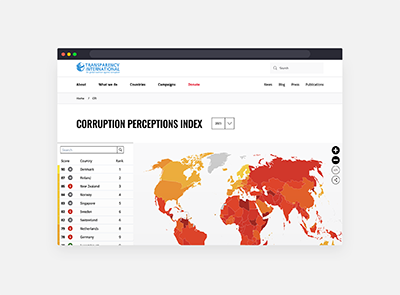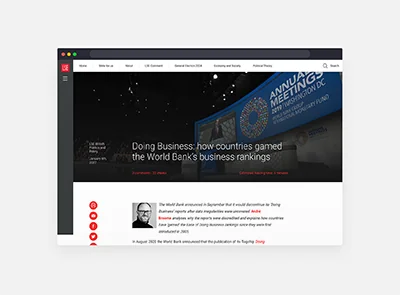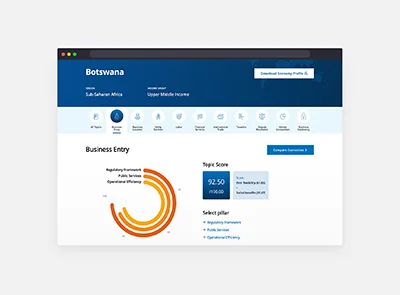Can the world’s most successful index get back up the rankings?
After a three-year hiatus, the Ease of Doing Business Index is back with a new name and a new look. Once so powerful it shaped government policies, its success ended in scandal. Now rebranded as Business Ready, can the revamped index overcome its tarnished reputation to become as influential as before?

You know your ranking model is influential when national governments change policies with the explicit goal of boosting their position on your index. That was the power of the Ease of Doing Business Index (also known as Doing Business) until 2021.
However, the index’s success became its downfall. Some governments set up dedicated teams with an explicit goal of improving the country’s performance on the index. If those teams’ activity was solely focussed on positive policy reform, that would be great; unfortunately, in at least some cases, they were simply trying to game the results.

World Bank’s Business Ready Index
Index ranking optimisation (gaming the results)
To give an example of how that could happen, we need to take a brief detour into the world of qualitative indicators. Bear with me. In many indexes grappling with complex topics, there is a perennial problem of data availability. Imagine you want to measure the number of days it takes to set up a new business (this was one of the indicators in Doing Business). You will find that most of the time the data either doesn’t exist or is rarely updated by governments. Instead, put very simplistically, you’d need to ask a few experts or businesses for their views, and use those to create a numerical score for your index.
Many studies use this approach, and it is valid. Take Transparency International’s long-running Corruption Perceptions Index (CPI). Transparency International goes to great lengths to use robust and comparable data across countries, but measuring actual corruption is not viable — for obvious reasons. So the CPI does something different, and the clue is in the name: it measures people’s perceptions of corruption. It asks local businesses and experts whether they think there’s much bribery, nepotism and other forms of corruption in their country. This foundational input is then bolstered with other data points. The data doesn’t aim to measure corruption; instead, it’s about assessing which countries are more, or less, corrupt.

Transparency International’s Corruption Perceptions Index (CPI)
This technique can work well, but it got a bit shaky as Doing Business’s fame grew. Some governments that were anxious to move up the rankings started urging the World Bank to tweak the methodology used to assess their ratings, or to use the views of specific experts. Governments that disagreed with their assessments often placed significant pressure on the analysts responsible for evaluating a country’s scores and data points, subjecting them to strong criticism. In the end, an internal review revealed that officials had improperly manipulated a number of countries’ scores.

Doing Business: how countries gamed the World Bank’s business rankings (LSE British Politics and Policy)
New rigour
The criticism must have stung, because the team behind the World Bank’s new Business Ready report has spent three years trying to address those issues. The new methodology handbook lands with a thump at 704 pages. One obvious change is the attempt to gather inputs from a much broader pool of businesses and experts — more than 29,000 firms across the 50 countries that are currently included in the index. It’s difficult to distort a ranking when you have to influence that many respondents.
The Bank has compiled a mountain of new data: nearly 1,200 indicators in total. These should help to underpin its genuine efforts to improve governance and guide policymakers, which is part of its mission.
Less appeal
But from a marketing and brand awareness perspective, a lot has been lost. Most obviously, there is no longer a ranking. Countries will no longer advertise or promote their position, or see their relative gains — or losses — from year to year. Instead, Business Ready assesses countries in three broad areas: regulatory framework, public services and operational efficiency. This reduces some of the pressure on governments to show that they’re moving in the right direction, but it also removes the original point of the study: to rank countries. To see how the UK does compared with Germany, or Australia compared with New Zealand.
Another loss (especially for those data fans) is that the interactive data tool is less engaging–and less specific. The previous Doing Business approach allowed you to quickly tell that in Botswana, for example, it took 48 days to set up a new business — compared with just 0.5 days for the then global leader, New Zealand. The new tool now presents the indicator as a relative score, meaning Botswana scores 21.75 out of a maximum of 25 (you’ll need to drill down to that indicator, as it’s not possible to link directly to a specific score).It’s not immediately clear whether this score is good or bad, and it’s hard to tell how to drill down into the indicator to find the new total for the number of days. Overall, the effort to re-establish its credibility has led to the loss of some genuinely interesting detail.

World Bank’s Business Ready Index (Starting a business, Botswana data)
Closing thoughts
These criticisms are those of a thought leadership specialists who helps companies stand out from the crowd, and because indexes can be powerful ways to build a brand, create awareness and generate coverage. And ultimately that fosters engagement.
With Business Ready, however, the World Bank’s goal isn’t to create a famous index or to (re)build a prominent brand, but to correct the faults of its previous approach. This is clearly the more important objective to achieve. But our prediction is that while it will provide more data that is less open for manipulation, it will also unfortunately attract less coverage – and in turn less (real) reforming zeal from governments.
Sign up to the newsletter
We help organisations stand out, speak with authority and spark inspiration, so change can happen. That’s real intelligence with influence. Sign up to our newsletter to get regular updates.
Subscribe






 Back
Back

 Book a meeting
Book a meeting
 Book a meeting
Book a meeting

